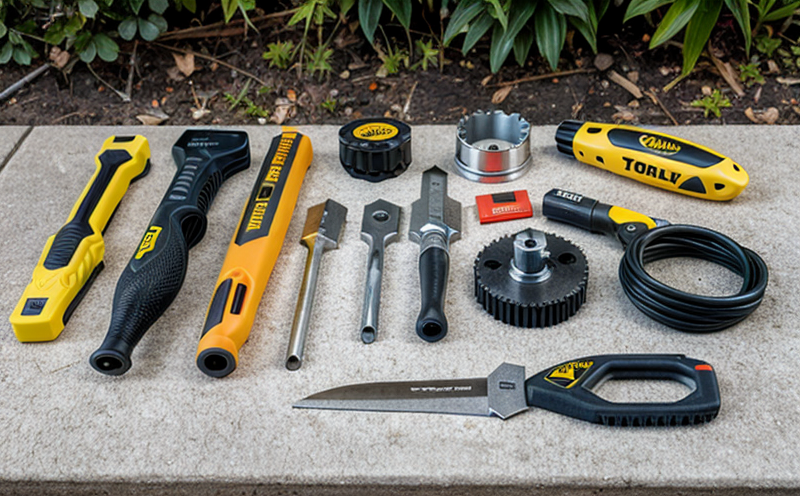Overcharge Protection Testing in Rechargeable Tools
In today’s fast-paced world, rechargeable tools have become an indispensable part of DIY and professional workshops. These tools are designed to provide convenience and efficiency by reducing the need for frequent manual tool changes. However, a critical concern is ensuring that these devices operate safely under all conditions, including overcharge scenarios. Overcharge protection testing in rechargeable tools ensures that the battery management system functions correctly, preventing potential hazards such as overheating, fire risks, or even explosions.
The importance of this testing cannot be overstated. According to international standards like ISO 13850 and IEC 62368-1, which regulate the safety aspects of electrically operated portable tools, overcharge protection is a mandatory feature to protect users from risks associated with prolonged charging.
The process involves simulating various overcharge conditions that may occur during normal use or accidental scenarios. This testing helps manufacturers identify any potential weaknesses in their product design and ensures compliance with regulatory requirements. By conducting thorough overcharge protection tests, companies can enhance user safety while maintaining the integrity of their brand reputation.
During testing, samples are subjected to controlled overcharging conditions that exceed nominal charging limits by a predetermined margin. The duration and intensity of these conditions are carefully calibrated based on product specifications and industry best practices. Once the test is completed, engineers analyze data collected from sensors embedded within the battery pack to evaluate performance metrics such as temperature rise, voltage regulation, and current flow.
It’s essential for quality managers and compliance officers to understand that overcharge protection testing goes beyond mere certification purposes; it serves a dual role – ensuring product safety and providing valuable insights into areas requiring improvement. For R&D engineers working on new designs or improving existing models, this test offers critical feedback which can lead to enhanced performance and longer battery life.
Compliance with relevant standards not only protects consumers but also helps businesses avoid costly recalls and legal issues. As procurement teams evaluate suppliers for future projects, they should consider third-party labs like ours that specialize in such specialized tests. Our experienced personnel use state-of-the-art equipment to conduct these rigorous assessments under real-world conditions.
The demand for reliable overcharge protection testing has surged with increasing public awareness about electrical safety issues. As more DIY enthusiasts turn towards eco-friendly solutions, there is growing pressure on manufacturers to prove their commitment to sustainability through robust quality assurance measures. Our services play a crucial role in meeting these expectations by offering comprehensive evaluations that go far beyond basic compliance checks.
By partnering with us early in the product development cycle, companies can gain competitive advantage by incorporating best practices into initial design iterations instead of addressing deficiencies later on. Early intervention ensures minimal disruption to production schedules while maximizing long-term profitability through enhanced customer satisfaction and reduced warranty claims.
Benefits
- Promotes safe use of rechargeable tools in everyday applications
- Achieves compliance with international safety standards (ISO 13850, IEC 62368-1)
- Enhances brand reputation by demonstrating commitment to consumer protection
- Identifies design flaws early in the product lifecycle for continuous improvement
- Saves costs associated with potential recall campaigns or product liability lawsuits
- Supports sustainable manufacturing processes that prioritize user safety and environmental impact
- Bolsters confidence among consumers who value reliability when making purchasing decisions
Industry Applications
| Application Area | Description |
|---|---|
| DYI Enthusiasts | Safeguard against accidental overcharging during home projects. |
| Professional Tradespeople | Avoid risks associated with prolonged use in demanding work environments. |
| Application Area | Description |
|---|---|
| Manufacturers | Evaluate battery management systems before mass production begins. |
| Safety Inspectors | Ensure compliance with regulatory requirements during certification processes. |
Quality and Reliability Assurance
The success of any product hinges on its ability to perform consistently across various conditions. Overcharge protection testing plays a vital role in ensuring that rechargeable tools meet these expectations by addressing both immediate safety concerns and long-term reliability issues.
When conducting these tests, our laboratory adheres strictly to established protocols outlined by relevant standards organizations such as ISO 13850 and IEC 62368-1. These guidelines provide clear instructions on how to simulate overcharge conditions accurately while monitoring key performance indicators like temperature rise and voltage fluctuations.
One of the challenges faced during this type of testing is maintaining consistent results across multiple samples from different batches or suppliers. To address this challenge, we employ advanced statistical methods that allow us to identify trends indicative of broader quality issues within a production batch rather than isolated anomalies.
Beyond simply identifying defects, our approach emphasizes preventive maintenance strategies aimed at reducing the likelihood of future failures. By working closely with clients throughout each stage of testing, from initial setup through final report generation, we ensure that all relevant stakeholders receive actionable insights they can use to improve their products.





